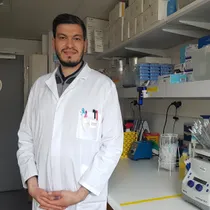- Home >
- Publications >
- MAIT cells monitor intestinal dysbiosis and contribute to host protection during colitis
MAIT cells monitor intestinal dysbiosis and contribute to host protection during colitis
Authors
Yara El Morr, Mariela Fürstenheim, Martin Mestdagh, Katarzyna Franciszkiewicz, Marion Salou, Claire Morvan, Thierry Dupré, Alexey Vorobev, Bakhos Jneid, Virginie Premel, Aurélie Darbois, Laetitia Perrin, Stanislas Mondot, Ludovic Colombeau, Hélène Bugaut, Anastasia du Halgouet, Sophie Richon, Emanuele Procopio, Mathieu Maurin, Catherine Philippe, Raphael Rodriguez, Olivier Lantz, François Legoux
Abstract
Intestinal inflammation shifts microbiota composition and metabolism. How the host monitors and responds to such changes remains unclear. Here, we describe a protective mechanism by which mucosal-associated invariant T (MAIT) cells detect microbiota metabolites produced upon intestinal inflammation and promote tissue repair. At steady state, MAIT ligands derived from the riboflavin biosynthesis pathway were produced by aerotolerant bacteria residing in the colonic mucosa. Experimental colitis triggered luminal expansion of riboflavin-producing bacteria, leading to increased production of MAIT ligands. Modulation of intestinal oxygen levels suggested a role for oxygen in inducing MAIT ligand production. MAIT ligands produced in the colon rapidly crossed the intestinal barrier and activated MAIT cells, which expressed tissue-repair genes and produced barrier-promoting mediators during colitis. Mice lacking MAIT cells were more susceptible to colitis and colitis-driven colorectal cancer. Thus, MAIT cells are sensitive to a bacterial metabolic pathway indicative of intestinal inflammation.








